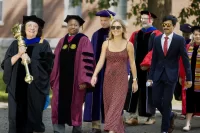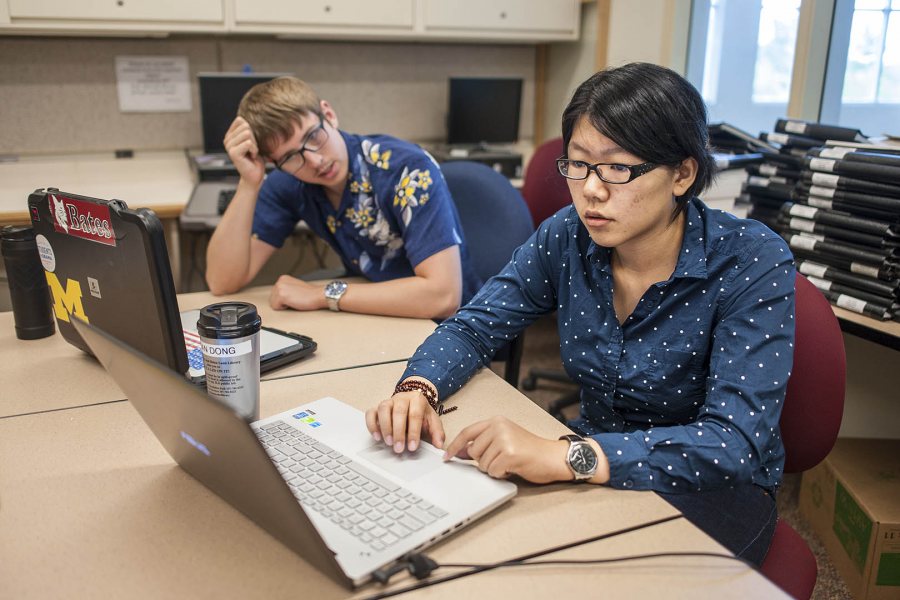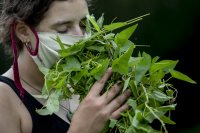
Summer Student Work: Fan Dong ’17 investigates fracking’s health benefits
The question of harm to the health of people living near “fracking” sites is among the reasons that this fossil fuel-extraction process is so controversial. But could fracking have health benefits, too? Fan Dong ’17 is helping Assistant Professor of Economics Nathan Tefft, an expert in health economics, find out.

Fan Dong ’17, at right, is serving as a research assistant to economics professor Nathan Tefft this summer, helping to assess potential health benefits of fracking. With her is a second Tefft research assistant, Mike Varner ’17, who is studying economic determinants of household expenditures on dietary supplements. (Josh Kuckens/Bates College)
Name: Fan Dong
Hometown: Beijing
Major: Economics and politics
Research funding: Stangle Family Fund Grant for Research in Economics and Law
1. What is your project?
It’s called “Quantifying Health Benefits of Fracking: The Decline of Coal and Air Quality.” As fracking increases the amount of natural gas we use, it could help decrease the coal we use to generate electricity. In that aspect it should help the environment, because the less coal you burn, the better the air quality.
That’s what we’re trying to study — the amount of electricity generation fueled by fracking related to air quality and to the birth weights of children, because studies say there is a relationship between infant birth weight and air quality.
I thought it was pretty fascinating the first time Professor Tefft talked to me about it. His research is pretty close to our day-to-day lives.
2. What’s your role in the research?
I’m working with the birth-weight data. First I got raw childbirth data from the National Center for Health Statistics. The NCHS natality dataset is huge, containing all kinds of information, such as mother’s residence county, birth occurrence county, birth month and year, delivery method, etc.
Then I cleaned the data — picked the variables that are relevant to our study, recoded missing values, deleted birth data from outside the U.S., and so on. I created a new dataset that is neat, contains all the necessary information for our study and is ready for further analysis.
I used data analysis software called Stata to do all the data selection. I also spent some time to learn R, another statistical software — kind of a programming language — and used it to make a U.S. county map that contains information about children’s birth weights. Then I sent our dataset, along with other summary statistics and the maps I made, to our co-authors, who have the electricity data.
We are collaborating with researchers at the University of Washington, University of Tennessee, and University of California, Berkeley. They’re more expert in fracking and electricity generation, and Professor Tefft is the expert in health.
3. What have you enjoyed about this work?
After doing all this analysis, I can answer a question with great confidence, because I have all the data and I have controlled the process. So it’s not that I feel that X is correlated with Y, but that I can prove it. That’s the most satisfying part.
Also, if we can find something in this project, it could be a valuable topic for my thesis. Because I come from Beijing, and it is well-known for its air quality [she smiles ruefully]. So maybe for my thesis I can use techniques that I learned from this project to do something relevant for Beijing air quality.
4. What would you tell a younger student about the virtues of doing summer research at Bates?
I’d recommend it for your freshman or sophomore summer. When you devote yourself to a single project, you’ll learn how to do research in this field and all the methods and procedures. It’s a good way to prepare for an internship and for your 300-level courses, and also for thesis.




